- Home
- James Joyce
Ulysses
Ulysses Read online
PENGUIN BOOKS
Ulysses
James Joyce was born in Dublin on 2 February 1882. He was the oldest of ten children in a family which, after brief prosperity, collapsed into poverty. He was none the less educated at the best Jesuit schools and then at University College, Dublin, where he gave proof of his extraordinary talent. In 1902, following his graduation, he went to Paris, thinking he might attend medical school there. But he soon gave up attending lectures and devoted himself to writing poems and prose sketches and formulating an ‘aesthetic system’. Recalled to Dublin in April 1903 because of the fatal illness of his mother, he circled slowly towards his literary career. During the summer of 1904 he met a young woman from Galway, Nora Barnacle, and persuaded her to go with him to the Continent, where he planned to teach English. The young couple spent a few months in Pola (now in Croatia), then in 1905 moved to Trieste, where, except for seven months in Rome and three trips to Dublin, they lived until June 1915. They had two children, a son and a daughter. Joyce’s first book, the poems of Chamber Music, was published in London in 1907 and Dubliners, a book of stories, in 1914. Italy’s entrance into the First World War obliged Joyce to move to Zürich, where he remained until 1919. During this period he published A Portrait of the Artist as a Young Man (1916) and Exiles, a play (1918). After a brief return to Trieste following the armistice, Joyce determined to move to Paris so as to arrange more easily for the publication of Ulysses, a book on which he had been working since 1914. It was, in fact, published on his birthday in Paris in 1922 and brought him international fame. The same year he began work on Finnegans Wake, and though much harassed by eye troubles and deeply affected by his daughter’s mental illness, he completed and published that book in 1939. After the outbreak of the Second World War, he went to live in unoccupied France, then managed to secure permission, in December 1940, to return to Zürich, where he died on 13 January 1941. He was buried in the Fluntern Cemetery.
Declan Kiberd was born in Eccles Street, Dublin, in 1951. He graduated from Trinity College before going on to take a doctorate at Oxford University. His publications include Synge and the Irish Language (1979), Anglo-Irish Attitudes (1984) and Men and Feminism in Modern Literature (1985). He has lectured in over fifteen countries and written many articles and television scripts on the literature and politics of Ireland. A former director of the Yeats International Summer School, he has taught for more than a decade at University College Dublin. He is married, with two daughters and a son.
Seamus Deane is General Editor for the works of James Joyce in Penguin. He is Keough Professor of Irish Studies at the University of Notre Dame, Indiana.
JAMES JOYCE
_______________
ULYSSES
WITH AN INTRODUCTION
BY DECLAN KIBERD
PENGUIN BOOKS
Published by the Penguin Group
Penguin Books Ltd, 80 Strand, London WC2R 0RL, England
Penguin Putnam Inc., 375 Hudson Street, New York, New York 10014, USA
Penguin Books Australia Ltd, 250 Camberwell Road, Camberwell, Victoria 3124, Australia
Penguin Books Canada Ltd, 10 Alcorn Avenue, Toronto, Ontario, Canada M4V 3B2
Penguin Books India (P) Ltd, 11 Community Centre, Panchsheel Park, New Delhi – 110 017, India
Penguin Books (NZ) Ltd, Cnr Rosedale and Airborne Roads, Albany, Auckland, New Zealand
Penguin Books (South Africa) (Pty) Ltd, 24 Sturdee Avenue, Rosebank 2196, South Africa
Penguin Books Ltd, Registered Offices: 80 Strand, London WC2R 0RL, England
www.penguin.com
First published in Paris by Shakespeare and Company 1922
This edition first published in Great Britain by The Bodley Head 1960
and in the USA by Random House 1961
Reset and published in Penguin Books 1968
The 1960 Bodley Head text offset and reissued with an introduction 1992
Reprinted in Penguin Classics 2000
Introduction copyright © Declan Kiberd, 1992
All rights reserved
The moral right of the author of the introduction has been asserted
Except in the United States of America, this book is sold subject to the condition that it shall not, by way of trade or otherwise, be lent, re-sold, hired out, or otherwise circulated without the publisher’s prior consent in any form of binding or cover other than that in which it is published and without a similar condition including this condition being imposed on the subsequent purchaser
9780141921303
PREVIOUS EDITIONS OF ULYSSES
SHAKESPEARE AND COMPANY, PARIS
February 1922: 1,000 numbered copies
EGOIST PRESS, LONDON
October 1922: 2,000 numbered copies, of which 500 copies
were detained by the New York Post Office Authorities
EGOIST PRESS, LONDON
January 1923: 500 numbered copies, of which 499 copies
were seized by the Customs Authorities, Folkestone
SHAKESPEARE AND COMPANY, PARIS
January 1924: unlimited edition (reset 1926)
THE ODYSSEY PRESS,
HAMBURG, PARIS, BOLOGNA
December 1932: unlimited edition
RANDOM HOUSE, NEW YORK
January 1934: unlimited edition
LIMITED EDITIONS CLUB, NEW YORK
October 1935: 1,500 copies, illustrated and signed by Henri Matisse
THE BODLEY HEAD, LONDON
October 1936: 1,000 copies, of which 100 are signed by the author
THE BODLEY HEAD, LONDON
September 1937: first unlimited edition
THE BODLEY HEAD, LONDON
April 1960: reset edition
RANDOM HOUSE, NEW YORK
1961: reset edition
PENGUIN BOOKS, LONDON
1968: reset, unlimited paperback edition
FRANKLIN LIBRARY, NEW YORK
Between 1976 and 1979 three illustrated editions
were issued in special bindings
GARLAND PUBLISHING, NEW YORK
June 1984: critical and synoptic edition
CONTENTS
Introduction
Short History of the Text
ULYSSES
INTRODUCTION
THE BOOK
It is no accident that the last lines of Ulysses read ‘Trieste-Zürich-Paris, 1914–1921’. Joyce had to scurry with his family from city to city, in his attempt to avoid the dangers of World War I, as he created a beautiful book in a Europe bent on self-destruction. He seems from the outset to have anticipated Tom Stoppard’s brilliant joke in Travesties:
‘What did you do in the Great War, Mr Joyce?’
‘I wrote Ulysses. What did you do?’
Joyce affected an unconcern for its battles, but it is clear that the war touched him to the quick. The heroic abstractions for which soldiers died seemed to have an increasingly hollow sound. Like Stephen Dedalus, Joyce feared ‘the big words which make us so unhappy’. If history was a nightmare, it was an heroic deception from which all Europe – and not just Ireland – was trying to awake. As he teaches Roman history in the second chapter, Stephen contemplates the futility of war with a mind which reflects the costs of victory to the ancient Pyrrhus but also Joyce’s awareness of the bombardment of buildings in 1917. His vision of ‘toppling masonry’ and ‘the ruin of all space’ is at once a version of the Last Day and of contemporary Europe. It is, equally, Joyce’s protest against both.
Men had killed and maimed one another’s bodies in the name of abstract virtues, so Joyce resolved to write a materialist ‘epic of the body’, with a minute account of its functions and frustrations. Soldiers were dying in defence of the outmoded epic codes which permeate The Odyssey, so Joyce set out to remind readers t
hat if Odysseus – also known as Ulysses – was a god, he was most certainly a god with a limp. In this book, the very ordinariness of the modern Ulysses, Mr Leopold Bloom, becomes a standing reproach to the myth of ancient military heroism. Man’s littleness is seen, finally, to be the inevitable condition of his greatness. What one man does in a single day is infinitesimal, but it is nonetheless infinitely important that he do it. By developing Bloom’s analogies with Odysseus, Joyce suggests that the Greeks were human and flawed like everybody else. He had said so in a letter to his brother Stanislaus as early as 1905:
Do you not think the search for heroics damn vulgar? …I am sure however that the whole structure of heroism is, and always was, a damned lie and that there cannot be any substitute for individual passion as the motive power of everything.
Ulysses is one outcome of that letter and its sentiments. It is a protest against the squalid codes of chivalric militarism and against the sad machismo of sexual conquest.
Leopold and Molly Bloom may disagree, like all spouses, on many things, but they share a principled aversion to war, violence and licensed coercion. Molly laments ‘the war killing all the fine young men’. Leopold cautions against ‘equipping soldiers with firearms or sidearms of any description, liable to go off at any time, which was tantamount to inciting them against civilians should by any chance they fall out over anything’. That passage was probably prompted in Joyce’s mind by an account of how British soldiers, this time in Dublin, had fired on and killed civilians on Bachelors’ Walk in July 1914. The book is studded with Leopold Bloom’s pacific musings: ‘How can people aim guns at each other? Sometimes they go off. Poor kids.’ Such warnings were painfully real to Joyce, whose university classmate and fellow-pamphleteer, Francis Sheehy Skeffington, was murdered by a British officer during the Easter Rising of 1916 in Dublin. Skeffington, a pacifist and a champion of women’s rights, had tried to stop the looting of city shops, which was bringing discredit on the nationalist cause. Joyce was appalled at the news of his friend, whose qualities of civic-mindedness were re-created in the development of Bloom’s character.
In those early decades of the twentieth century, Joyce was reacting against the cult of Cúchulainn, which was purveyed in poems, plays and prose by writers such as Patrick Pearse, W. B. Yeats and Lady Augusta Gregory. As a student of twenty-one, he had written a pamphlet attacking the Irish Literary Theatre for its surrender to vulgar nationalism. (Skeffington’s co-publication had argued for the rights of Irish women to attend the national university.) Remarking that the natives of the island had never got beyond a miracle play, Joyce concluded that ‘the Irish Literary Theatre must now be the property of the most belated race in Europe’. When this swaggering failed to provoke a response, the young man made his celebrated and misunderstood visit to Yeats, which he terminated with the observation that the national poet (still in his thirties) was too old to be helped.
Behind the mockery and the pride, Joyce was making a telling point – that the two men came from different ages and different worlds. Yeats, though only seventeen years older than Joyce, believed in ancient heroism and wished only to make it live again in Ireland. Joyce was more modern. He contended that the ordinary was the proper domain of the artist, arguing that sensationalism and heroics could safely be left to journalists. He therefore side-stepped the story of Cúchulainn, the epic fighter who defended the gap of the north of Ireland against all-comers, even unto death. A central theme of such tales was the skill of Cúchulainn in glamorized combat and his capacity to make violence seem redemptive. Joyce was convinced that these narratives did not project the true character of the Irish people. When Wyndham Lewis spoke of the fighting Irish in a conversation, Joyce countered thoughtfully: ‘That’s not been my experience … a very gentle race.’ Though abused by occupying armies since 1169, the Irish had been too shrewd or too pacific to place a disciplined nationwide army in the field of battle, and they had never fully rallied behind the intermittent risings led by idealistic minority groupings. Even the rebels of 1916 enjoyed scant support during Easter Week. It was only a widespread aversion to subsequent British violence, in the protracted execution of rebel leaders, which galvanized support later in the year. The victory of Sinn Féin in the 1918 election was due largely to its policy of strenuously opposing the conscription of Irish males to fight in World War I. In so far as nationalists became implicated in deeds of violence in the following years of struggle, they suffered regular reductions in popular support.
So the Cúchulainn cult was objectionable to Joyce because it helped to perpetuate the libel of the pugnacious Irish overseas, while gratifying the vanity of a minority of self-heroicizing nationalists at home. At St Enda’s School, founded by Patrick Pearse in 1908 to educate the sons of nationalist families, Cúchulainn was described as ‘an important, if invisible, member of the staff; and the boys were urged to adopt his motto: ‘I care not if I live but a day and a night, so long as my deeds live after me.’ The fabled death of Cúchulainn, strapped to a rock, provided an image of Christ-like suffering to redeem a people; and, in truth, many former pupils of St Enda’s became rebels in the 1916 rising. To Joyce, however, Cúchulainn’s combination of aggression and pain must have seemed but an ill-disguised version of the ‘muscular Christianity’ preached in British public schools. The heroic past allowed to the subject people by the colonizer turned out, on inspection, to be a concealed version of the British imperial present. This explains why Joyce heaped such repeated mockery on the ‘Irish Revival’, exposing the extent to which its nationalism was an imitation of the original English model, rather than a radical renovation of the consciousness of the Irish race. He did not fail to note in Pearse a hatred of those English whom he was, all unconsciously, so keen to imitate; and he abandoned Pearse’s Gaelic League classes on discovering that his teacher (who would later cure this fault) could not praise Irish without denigrating the English language.
Joyce believed that a writer’s first duty might be to insult rather than to flatter national vanity. He wished to shock his compatriots into a deeper awareness of their self-deceptions. He had written Dubliners as ‘a chapter of the moral history of my country’ and had ended A Portrait of the Artist as a Young Man with the promise to forge the ‘uncreated conscience of my race’. Such solemn words suggest that Joyce saw himself as a national rather than a nationalist patriot, with something more valuable than the Cúchulainoid codes of Pearse and Yeats to teach his fellow-citizens. Joyce exploded the myth of the fighting Irish and, especially through his protagonist Bloom, depicted them as a quiescent, long-suffering but astute people, very similar in mentality to the Jews. This had, indeed, been a theme song of many Gaelic poets in earlier centuries. Writing of the enforced exile to Connacht during the Cromwellian plantations of the mid-seventeenth century, Feardorcha Ó Mealláin had seen in the fate of another ‘chosen people’ a version of his own:
Urscéal air sin tuigtear libh:
Clann Iosraeil a bhain le Dia
faoin Éigipt cé bhí a mbroid
furtacht go grod a fuair siad.
A story on that theme will explain your plight:
The children of Israel who stood by God
Although they were in captivity in Egypt
Were quickly given help.
By making its central character an Irish Jew, Joyce placed Ulysses squarely in this native literary tradition. He was honest enough to concede, however, that wise passiveness – at least in the case of the Irish – could sometimes shade into downright masochism or mere laziness. So he revised the myth of the bellicose Paddy with his repeated suggestion that the national disease was not pugnacity but paralysis, a denial of possibilities well captured in the ‘freeze-frames’ which constitute the tenth chapter of the book.
In considerations such as these may be found the answer to the question asked so often by readers of Ulysses: if Joyce wished to base his narrative on an ancient legend, why did he turn to Greek rather than Gaelic tales? Cúchulai
nn had already been appropriated by the militant nationalists of Dublin, whose politics were uncongenial to the pacific and internationalist Joyce. Ever since boyhood, he had been more attracted by the warm humanity of Odysseus. The ancient protagonist did not want to go to Troy, Joyce recalled, because he shrewdly sensed that the war was just a pretext employed by Greek merchants as they sought new markets. The analogy with a contemporary Europe plunged into carnage to provide profits for the barons of the steel industry would not have been lost on the man who called himself a ‘socialistic artist’. His central character was a nonentity who had absolutely no hankering to become a somebody, a quiet family-man, an ‘all-round man’. Neither a Faust nor a Jesus, Bloom was to eschew the sexual conquests of the former and the self-conquering celibacy of the latter. Despite his respect for the gentleness of Jesus, Joyce found him incomplete. He confided to Frank Budgen: ‘Jesus was a bachelor and never lived with a woman. Surely living with a woman is one of the most difficult things a man has to do, and he never did it.’
By rendering Bloom in such idiosyncratic detail, Joyce may have unwittingly created the impression that his character was complicated, even weird. ‘The thought of Ulysses is very simple,’ he insisted, ‘it is only the method which is difficult.’ The method – concentrating on the most seemingly insignificant minutiae – made possible one of the fullest accounts ever given by a novelist of everyday life. Many of the great modernist writers, from Conrad to Sartre, saw theirs as a literature of ‘extreme situations’, but Joyce was exceptional among them in cleaving to the quotidian, the great middle range of experience between exaltation and terror. Most of his bohemian contemporaries would have endorsed André Gide’s declaration of war on family life (‘Families, je vous haïs …’). Joyce embraced its banal routine as the friend of his art. Bohemia was never his native country. As he sat to have his portrait painted by Patrick Tuohy, Joyce was dismayed by the artist’s high-faluting talk of the soul: ‘Never mind my soul, Tuohy. Just make sure you get my tie right.’ This method he applied in his own art, chronicling with minute precision the contents of Bloom’s pockets, the nature of his food, the number of occasions on which he broke wind. He described his character pissing and shitting in order to show that here was a man thoroughly free of abstract pretension or bodily self-hatred. Joyce saw, earlier than most, that the modern cult of the body had been made possible only by a century of coy evasion; and his close analysis of Bloom’s daily actions exposed the laughable inadequacy of both attitudes. Like Lawrence, Joyce wanted to afford the body a recognition equal to that given the mind, but to a post-Victorian generation which had lost this just balance, both men appeared to elevate the body above all else. Devotees of Lawrence, for their part, have sometimes argued that the anatomization of the body on which the ground-plan of Ulysses is based – an organ per chapter – represents the ultimate abstraction of the human form. This might be felt to be true of the plan, but not of the actual reading of any chapter of Ulysses, where the interest invariably centres on the ways in which the characters experience their own bodies.

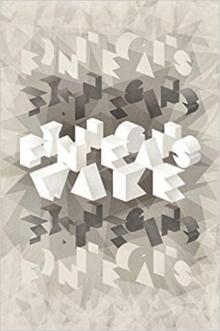 Penguin Classics the Restored Finnegans Wake
Penguin Classics the Restored Finnegans Wake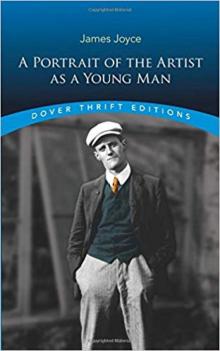 A Portrait of the Artist as a Young Man (Dover Thrift Editions)
A Portrait of the Artist as a Young Man (Dover Thrift Editions)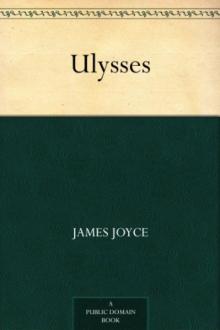 Ulysses
Ulysses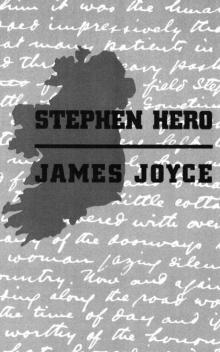 Stephen Hero
Stephen Hero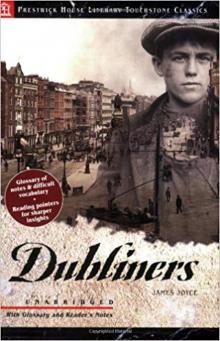 Dubliners
Dubliners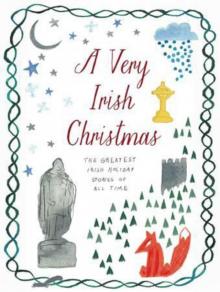 A Very Irish Christmas
A Very Irish Christmas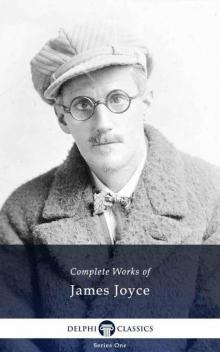 The Complete Works of JAMES JOYCE
The Complete Works of JAMES JOYCE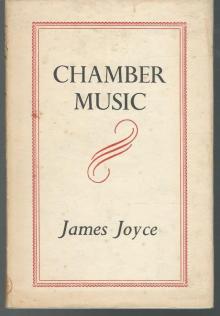 Chamber Music
Chamber Music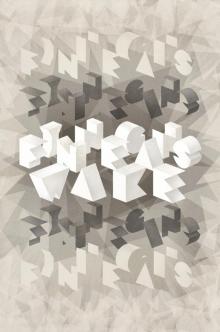 The Restored Finnegans Wake
The Restored Finnegans Wake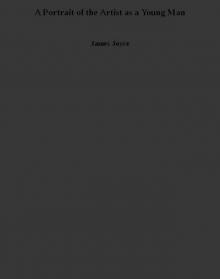 A Portrait of the Artist as a Young Man
A Portrait of the Artist as a Young Man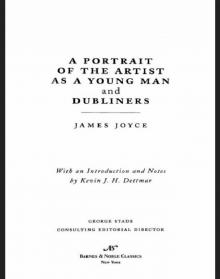 Portrait of the Artist as a Young Man and Dubliners (Barnes & Noble Classics Series)
Portrait of the Artist as a Young Man and Dubliners (Barnes & Noble Classics Series)